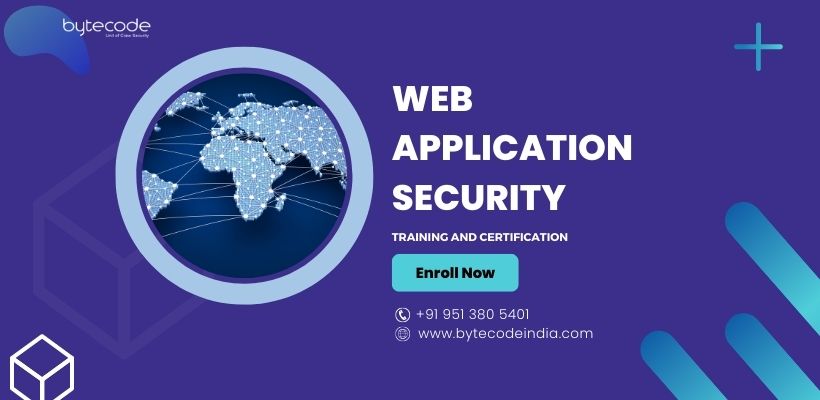Best Web Application Security Course in Delhi
Learn the authentic and best Web Application Security Course in Delhi that offers a genuinely practical approach to quality learning methodology via the best-in-class training faculties and mentors. With the sincere practice of Web Application Security Training in Delhi through the most skilled and experienced training staff via the Saket and Laxmi Nagar institutional branches, Bytecode Security is all set to deliver the best-in-class Web Pentesting Course.
This high-end web security course at our two branches provides the required knowledge needed to authenticate the best application security certification in the vicinity of Delhi, NCR.
Apply Now
Web Application Security Course in Delhi
Web Application Security Course in Delhi will provide complete information about the security challenges in Web Application Security and the security needed for the course. This course will help you understand how to see vulnerabilities in web applications as well as how to remove them.
Web Application Security Course Content
Web Application Security Course covers 26 comprehensive modules
Module 01: Improper Neutralization of Special Elements used in an OS Command (‘OS Command Injection’)
Module 02: SQL Injection
Module 03: Code Injection
Module 04: Unrestricted Upload of File with Dangerous Type
Module 05: Inclusion of Functionality from Untrusted Control Sphere
Module 06: Missing Authentication for Critical Function
Module 07: Improper Restriction of Excessive Authentication Attempts
Module 08: Use of Hard-coded Credentials
Module 09: Reliance on Untrusted Inputs in a Security Decision
Module 10: Missing Authorization
Module 11: Incorrect Authorization
Module 12: Missing Encryption of Sensitive Data
Module 13: Cleartext Transmission of Sensitive Information
Module 14: XML External Entities
Module 15: External Control of File Name or Path
Module 16: Improper Authorization
Module 17: Execution with Unnecessary Privileges
Module 18: Use of Potentially Dangerous Function
Module 19: Incorrect Permission Assignment for Critical Resource
Module 20: Improper Neutralization of Input During Web Page Generation (‘Cross-Site Scripting’)
Module 21: Use of Externally-Controlled Format String
Module 22: Integer Overflow or Wraparound
Module 23: Use of a Broken or Risky Cryptographic Algorithm
Module 24: Use of a One-way Hash Without Salt
Module 25: Insufficient Logging and Monitoring
Module 26: Download of Code Without Integrity Check
You Will Learn in the Web Application Security Course in Delhi
Through a verified process of delivering top-notch application security certification courses in the proximity of Delhi, NCR, our trainers and mentors will be able to provide the knowledge base that is required in the real-time multitude of job methodologies. The curriculum associated with the Best Application Security Training is well enhanced and confirmed by several web application security professionals around the world.
Bytecode Security always thinks of the betterment of its students, and hence, we have engaged the most skilled and versatile teaching trainers and mentors duly associated with the Web Application Security Certification. This authentic course involves various vulnerabilities, like QL injection, XSS, PHP injection, indirect object reference, CSRF, and many more.
Course Duration
• Course Duration: 60 Hours
• Course Level: Intermediate
• Include: Training Certificate
• Language: English, Hindi
• Course Delivery: Classroom Training
• Course pdf: Click here to Download
Web Application Security Course Review
Bytecode Cyber Security Unit of Craw Security
Frequently Asked Questions
Web Application Security Course in Delhi
What is Web application attack?
Serious weaknesses or vulnerabilities allow criminals to gain direct and public access to databases in order to churn sensitive data - this is known as a web application attack. Many of these databases contain valuable information (e.g. personal data and financial details) making them a frequent target of attacks
What is SQL Query Injection?
SQL injection, also known as SQLI, is a common attack vector that uses malicious SQL code for backend database manipulation to access information that was not intended to be displayed. This information may include any number of items, including sensitive company data, user lists, or private customer details.
What are application attacks?
Attackers were able to manipulate application input and obtain confidential data without being detected by network defense systems. Most vulnerabilities found in the proprietary code of Web applications are unknown to security defense systems; these are called zero-day vulnerabilities.
What is meant by Web security?
Web security is also known as “Cybersecurity”. It basically means protecting a website or web application by detecting, preventing, and responding to cyber threats. This integral division of Information Security is vital to the protection of websites, web applications, and web services.
What is Web security requirements?
The key Web services security requirements are authentication, authorization, data protection, and nonrepudiation. Authentication. Authentication ensures that each entity involved in using a Web service—the requestor, the provider, and the broker (if there is one)—is what it actually claims to be.

